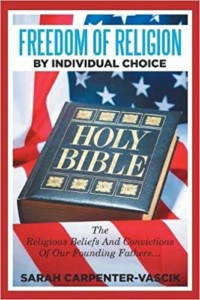Title: Freedom of Religion by Individual Choice
Author: Sarah Carpenter-Vascik
Publisher: Westwood Books Publishing
ISBN: 978-1948653596
Pages: 304
Genre: Religion
Interviewed by: Lisa Brown-Gilbert
Author Interview with Sarah Carpenter-Vascik
Today we are talking to Sarah Carpenter-Vascik author of “Freedom of Religion by Individual Choice.”
PBR: How long have you been writing?
My first effort was a fiction short story published in 1999, and I published a non-fiction book in 2012.
PBR: Do you have a favorite religious text that you feel resonates most with you? Why?
Psalm 46, verse 10 says “Be still and know that I am God.” It always struck me as odd that people pushing religious freedom on everyone rarely hear God’s voice speaking to them because they are so busy shouting about their relationship with ‘their God’.
PBR: How did you get involved with the subject of religious freedom in United States History?
I kept hearing conservative politicians and church officials using God and government in the same breath, insisting that America was ‘a Christian country’ and that we needed to ‘put God back into our government’. I didn’t remember my American history that way.
PBR: What prompted you to write and publish such an intensive work?
I wanted the work to be a measured response to this almost hysterical insistence about God, government and the infringement upon ‘religious freedom’, by using a historical perspective that incorporated the actual thoughts, words and ideas about what the Founding Father’s intentions were, without any editing, interpretation or commentary.
PBR: How much time was spent researching your book?
About 15 months.
PBR: Primarily, what target audience were you trying to reach with your work in this book?
I tried to write the book so that it would speak to the average reader, someone who, having been bombarded with all of today’s constant rhetoric, might wonder what the facts actually are. But, I didn’t want to publish a history text book, I didn’t want the work to be drab and dry (hence the absence of footnotes and other conventions). I wrote it from a personal perspective and tried to show that the Founding Fathers were very human in their mannerisms and points of view.
PBR: What can readers hope to gain by reading your book?
A deeper appreciation of what the Founders were faced with at the conclusion of the Revolutionary War. Here was an amazing opportunity to build a new nation from the ground up, and they realized what an incredibly rare and unique chance this was. Their wisdom, courage and intelligence, along with their ability to work together to build a consensus in the face of the many strong and often differing opinions, resulted in one of the greatest forms of government in the modern world. The take-away from all this is that we, as custodians of their efforts, have an obligation to maintain it.
PBR: What were some of the greatest challenges you faced while writing this book?
Not allowing my personal religious views to influence the material I chose to use in the book and how I presented it. This tends to be a blind spot when writers become involved in personal, deeply personal subjects like religion and politics.
PBR: Have you written any other works of this nature?
I published a book in 2012, entitled “Religion, Faith and the GLBT Community, a ground level view from a faithful exile.” The book examines the theological justification for the hatred and hostility that many religious groups and organizations direct at a small and socially marginalized segment of society. I tried to make a clear, objective case that there is no justification for it.
PBR: Please share your best advice for authors looking to write about religious subject matter?
It is vitally important to understand that religious views and beliefs are a core value for many members of society. Because these are deeply held personal beliefs, they are not correct or incorrect and any disagreement with them is often seen as an attack.



Follow Us